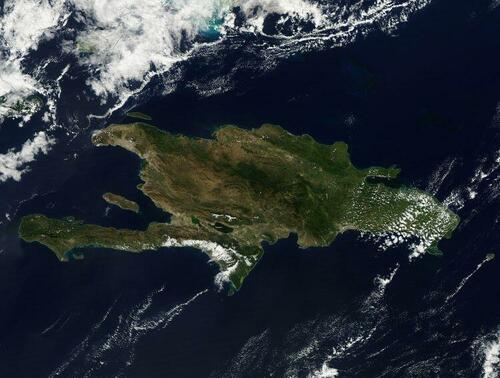The Human Tragedy In Haiti
Authored by Callista L. Gingrich via RealClear Politics,
Since late February, gang violence in Haiti has surged, overwhelming government and security forces and plunging the nation into further turmoil. The United Nations estimates that armed gangs now control 80 percent of the nation’s capital, Port-au-Prince.
The recent wave of violence in the Caribbean nation’s ongoing gang wars erupted as multiple armed groups banded together, pledging to oust Prime Minister Ariel Henry, who came to power after the assassination of President Jovenel Moïse in 2021 and announced postponing Haiti’s elections again last year.
Citing ongoing gang violence as one of the reasons for staving off elections, Henry flew to Kenya in February to press for the deployment of a U.N-backed police force to support the Haitian National Police in fighting the gangs. The armed groups responded by launching a series of coordinated attacks in Port-au-Prince and preventing Henry’s return to Haiti.
In the weeks that followed, gangs ravaged two prisons releasing more than 4,000 inmates into the country; destroyed power substations; attacked airports, police stations, and neighborhoods; and took control of major ports and water facilities.
More than 15,000 people have fled their homes in recent weeks. According to an anonymous woman who spoke with CBS News, “People go inside your house, killing, raping, all those things, burning your house.”
Americans have been urged to leave the country. Nearly 1,000 have filled out crisis intake forms asking for help or assistance to escape the turmoil. At the time of this writing, hundreds of Americans have not been able to evacuate.
During a briefing on March 12, the U.S. State Department announced that in addition to pledging a total contribution of $300 million, the United States helped to broker a deal that will form “a new presidential council that will select a new interim prime minister and pave the pathway for elections, as well as the deployment of the Multinational Security Support Mission.” Once the transitional council is established, Kenya will deploy the police force and Henry will step aside.
Despite this development, the situation on the ground for the people of Haiti remains desperate. A U.S. State Department spokesperson said during a press briefing on Monday, “It is not hyperbole to say that this is one of the most dire humanitarian situations in the world.”
Tragically, fear and suffering from gang violence in Haiti is not new – but is a daily reality for many Haitians.
There are an estimated 200 gangs operating in Haiti, and approximately 95 operate near Port-au-Prince. In 2023, more than 8,400 people were reported killed, injured, or kidnapped, more than two times the amount as the previous year. Further, compared to 2022, rape cases skyrocketed by 49 percent from January to August 2023.
Bringing violence to neighborhoods, gangs demand so-called protection money from residents, and when they can’t pay, threaten impoverished civilians. Twenty-eight-year-old Annie, who fled Port-au-Prince with her family two years ago, told the BBC, “I saw so many awful things I never thought I would see. We were afraid for our lives.”
She added, “We are living with death on a daily basis.”
In addition to gang violence, chronic political instability, natural disasters, foreign intervention, and debt have crippled Haiti’s economy, fueled violence, and hindered development.
Haiti is the poorest country in the Western Hemisphere, and more than half of the population lives below the World Bank’s poverty line. In a population of 11.7 million people, approximately 5.5 million Haitians require humanitarian assistance, more than 4 million people are affected by food insecurity, and 19,000 are experiencing famine.
“I wake up in the morning and if we have sugar in the house, we make sugar water and put a bit of salt in it, just to drink it and stop the pain of hunger,” Kerby, a Haitian who fled Port-au-Prince due to gang threats, recently told the BBC.
Amid the recent developments, it is unclear what the governance of Haiti will look like and how it will impact the future of the Caribbean nation.
As gang violence and chaos continue to wreak havoc, the international community must work to bring peace and stability to Haiti.
For more commentary form Callista Gingrich, visit Gingrich360.com.
Tyler Durden
Thu, 03/28/2024 – 19:00
via ZeroHedge News https://ift.tt/LZBV8ep Tyler Durden
